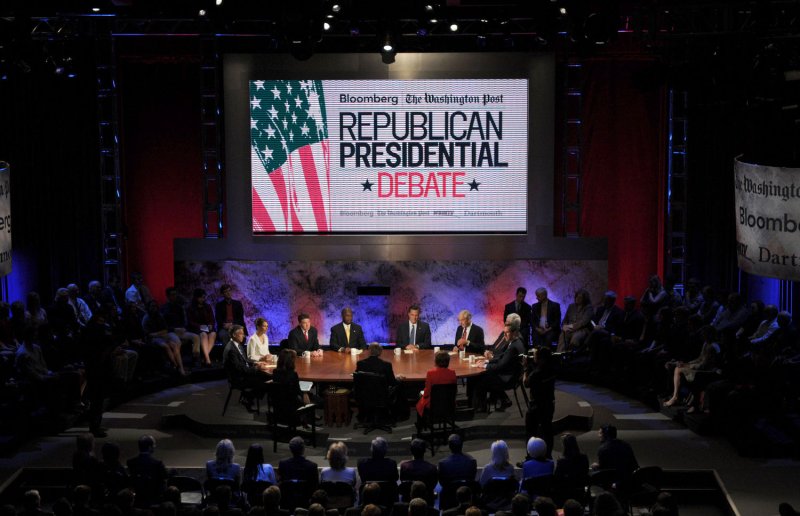Flanked by large images of former President Ronald Reagan, the 2012 Republican presidential candidates speak during a presidential debate sponsored by Bloomberg and The Washington Post held at Dartmouth College in Hanover, New Hampshire, U.S., on Tuesday, Oct. 11, 2011. The event moderated by U.S. television talk show host Charlie Rose and featuring eight Republican candidates, presents the first debate of the 2012 political season focused solely on the economy. UPI/Daniel Acker/Pool |
License Photo
ROCHESTER, Mich., Nov. 9 (UPI) -- Eight candidates for the Republican presidential nomination focused on the U.S. economy Wednesday in a debate in Rochester, Mich.
Following the debate, telecast live on CNBC, one of the most talked about moments involved Texas Gov. Rick Perry, who said he would cut three Cabinet departments but then was able to name only two -- education and commerce. As he was trying to summon up the name of the third, one of the other candidates suggested the Environmental Protection Agency and Perry agreed that's what he had been trying to think of.
However, following a commercial break, Perry said he remembered the third agency he would cut is the Department of Energy.
The first question of the debate, on whether the United States should have a role in helping Italy avoid financial catastrophe, went to Georgia business executive Herman Cain. He said the United States "can't save Italy" and he would focus on growing the U.S. economy.
Former Massachusetts Gov. Mitt Romney said Europe "is able to take care of their own problems."
"We do not need to step in to save banks in Europe or banks in the United States who have Italy debt," he said, while predicting "there's going to be an effort to draw us in" to the European crisis.
Rep. Ron Paul of Texas said European debt needs to be liquidated "because the debt is unsustainable."
"If you keep bailing out and propping people up you just prolong the agony," he said.
Former Utah Gov. Jon Huntsman said the U.S. economy will face "long-term disaster and failure" as long as there are banks considered "to big to fail."
"We've got to get back to a day and age where we have properly sized banks and financial institutions," he said.
Character issues discussed during the debate included a perception among Romney critics that he takes multiple sides of key issues, and recent accusations of sexual harassment against Cain.
"I think that people understand that I'm a man of steadiness and constancy," Romney said.
When panelist Maria Bartiromo asked Cain about sexual harassment, some in the audience booed. Cain drew applause when he called the accusations "unfounded."
The debate could be considered the beginning of the winnowing process, political insiders said, as the rivals look to hang in until the Iowa caucuses in January, not trying to introduce themselves and their platforms to voters, Politico said.
With the exception of front-runner Romney and Paul, political observers say all of the GOP hopefuls are one misstep away from ending their bids.
Handicappers said Cain may not be a realistic candidate much longer if he can't steer the conversation away from accusations of sexual harassment that have plagued his campaign since last week.
Conservatives such as Perry and U.S. Rep. Michele Bachmann of Minnesota can ill-afford to sit on the sidelines in another candidate forum, Politico said. Former House Speaker Newt Gingrich and former U.S. Sen. Rick Santorum of Pennsylvania must seize the moment, because they may not get another chance. Huntsman also is running short on time trying to get voter buy-in with his maverick message.
"Voters have formed general impressions of most of the candidates by this point, but a mixed or poor impression hasn't been fatal," Dan Schnur, a former adviser to John McCain's 2000 campaign, told Politico. "Going forward, any problems become much more damaging because the clock is ticking."
Michigan Republican National Committeeman Saul Anuzis said the debates were becoming more about "which people make the mistakes and have the most to lose, not the most to gain."
Republican presidential campaign veteran Mary Matalin said she didn't think the debate in Michigan could shift the arc of the GOP race, saying the unsettled nature of the race could allow some candidates to stay in longer.
"The primary electorate is still torn between wanting to accelerate the closure around an unsatisfactory conservative [Romney] and get going against Obama and holding out for" a better option, Matalin said. "There appears to be no consolidation in the anti-Romney vote and no growth above the Romney ceiling."















